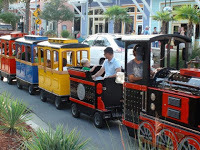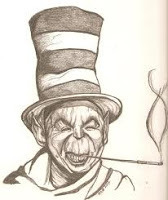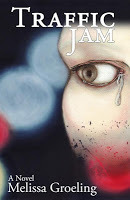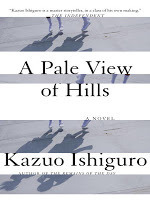Aneta Cruz's Blog, page 4
March 4, 2013
It's a Mall World After All!
It’s been quite some time since I last visited the mall. So, on Saturday, I decided to meet my sister-in-law there. I entered through the Barnes and Noble bookstore, did story time (Dr. Seuss Day) with my kids, and thought to myself: Why don’t I come here more often? This place is not so bad. Then, as I walked out of the bookstore and into the artificially lit giant two-story monster of a building, I remembered why I stay away from this MADHOUSE.
The upper level is built on some kind of a sliding structure—at least that’s the best I can describe it—so it constantly shakes and glides back and forth. This, apparently, was the genius idea of engineers who in order to prevent the building from collapsing during our frequent earthquakes decided to make people sea sick. Remember back in the day when you were a child and your sibling wanted to torture you, so s/he would jump up and down on your bed while you were asleep, throwing your motionless, resting body into the air in awkward intervals? No? Was it just me? At least imagine, and you’ll see how I felt walking through the upper level of the mall. While my dizzying body tried to sustain its equilibrium, I became very much aware of the echo. Oh. My. God. People, please stop having so many kids! On every corner, I could hear screams reverberating off the high ceilings, puncturing my ears. Parents with four, five, six children! Being dragged, yelled at, whined, nagged…I want a pretzel, lemonade, ice cream, that teddy bear, those shoes…! No? Okay, then I’ll just throw myself in front of this lady’s feet and block her way and bang my head against the floor! My sister-in-law translated the Spanish speaking tantrum. Although I feel like it wasn’t necessary as all tantrums look and sound the same in any language.

Finally, when my legs have turned into a gelatinous substance and my ears began to bleed, we escaped by taking the escalator downstairs. I could no longer stand the brightly illuminated floor above, which now from below seemed so white and peaceful. Like a slice of heaven. But I already knew what kind of hell was going on up there. Making our way through the lower level, we did not expect any more drama. No. No drama. Only murder. As we turned the corner and headed through what looked like a “main street” of the mall, I heard whistling behind me. Not the kind you’re thinking. This was nothing flirtatious. It was more like a whistle from a train engine you buy at the toy store. Great! I thought to myself. Now, we’ll be followed with some more parents and their six children, who just got a toy train and will be whistling at our backs with it until we move out of the way. As the noise got louder and annoying, I turned around to politely tell them to shut the hell up, and OH SHIT! There was a train coming at me! Who the fudge puts a train in the mall? What is this—a carnival? There was an actual train, with a toothless conductor in blue overalls, pulling and tugging on a string connected to a whistle. As I stood there, mesmerized and frozen to the floor, he gave out a gummy grin and rang the bell. Round One! In the blue corner we have a conductor with no need for a mouth-guard, and in the red corner we have a woman falling into a tunnel-vision. If my sister-in-law hadn’t pulled me aside, I would have been knocked out by a train. I glared at the conductor and then at the happy children waving at random strangers from the wagons.

I was ready to flee. The mall is a dangerous, noisy place! But it wasn’t finished with me yet. As we headed toward the exit, sounds of children’s music drifted toward us. Now it was my sister-in-law and I who were being dragged toward the songs by our children. Luckily, between the two of us we only had three. Having lost my trust in the surroundings, I approached cautiously. What a sweet thing to do for kids on this special Dr. Seuss' day, I thought when I saw that tables were set up in a large circle and children and their parents were decorating cookies, coloring Dr. Seuss’ characters, and reading his many wonderful books. Of course we wanted to join the festivities to ease our anxiety of the mall. Just as we stood in line to collect our activity kit, Mr. Cat in the Hat himself came out of nowhere to greet everyone. My seven year old son immediately squeezed my hand and even my twelve year old daughter hid behind my back. I mouthed at my sister-in-law, “This is the scariest cat I’ve ever seen.” AND I’m a dog person.

Mr. Cat in the Hat was really a tall, lean, flat-chested girl in a costume that must have been a remnant of a clearance at some shabby Halloween store. She wandered back and forth among the children who were forced to put on a smile so their parents could snap a photo of them with the famous cat. And as soon as the Cat in the Hat’s smeared eyeliner pointed in our direction, we hastily threw our coloring kits on the table and frantically ran for the exit.
The polluted air of the parking lot seemed like a breath of fresh air in comparison to the atmosphere of the strange dimension from which we just came. I can honestly say that I admire other people for their bravery to enter the mall world. As for me, I think it’ll be quite some time again before I show my mug there.
P.S. If you’re going to Hollister, take a flashlight.
Published on March 04, 2013 15:54
February 23, 2013
Sh!t Happens
Restroom. Oval Office. The Lou. Toilet. The Crapper. The John. The Throne. The Bucket. Ceramic Pot. The Palace. Potty.What you call it is up to you. It doesn’t matter. It always represents the same thing. PRIVACY! Not in my house. [sigh]

Why is my restroom the information booth, the communication center, the justice department, or even the oracle’s cave whenever I decide to seek some privacy? Like most of you, I sometimes like to retreat to the only part of my home that should offer silence, seclusion, something to read, and something to sit on. Unfortunately, this place is my cell in hell.
Here, instead of silence, I am attacked by fist-bombs banging on the door, dog paws scratching underneath it, voices shrieking and demanding answers to “Where’s my…[insert item of your choice]?”, barking, a not very nice verbal exchange between a seven and a twelve year old, more barking, then more yelling demanding to know whose side I’m on and that I punish the provocateur justly (who, of course, my son claims is my daughter and my daughter claims is my son) and more barking. And as if this wasn’t enough to deal with, I also have to foretell the future and predict the outcome of fantastic, worst case scenarios only my children’s imagination can conjure up, such as “What if someone broke in and stole us while you’re in there, Mom?”
I’d like to reply, “They would return you in a heartbeat!”, but instead, I have to act as if I’m not in the middle of a very important business of taking my body’s trash out and loudly calculate the odds of that nothappening in order to ease the mind of the hooligans in front of my restroom door.
But, as soon as the sound of the cascading water from the flushing of the restroom, the Oval Office, the Lou, the toilet, the Crapper, the John, the Throne, the Bucket, the Ceramic Pot, the Palace, or the Potty can be heard and the door to the would-be-sanctuary opens, the noisemakers in front of it scatter. Don’t get me wrong, I love my children and my dog, but I will deal with their crap!
Published on February 23, 2013 15:41
February 15, 2013
Book Review of Loving Your Lies by Piper Shelly
Click on the "Book Reviews" page on the right side bar to read my review of Piper Shelly's Loving Your Lies!What a pleasure to read a novel by such a talented writer!

Don't forget to leave a comment. I love hearing from you!

Don't forget to leave a comment. I love hearing from you!
Published on February 15, 2013 17:06
January 27, 2013
Book Review of Traffic Jam by Melissa Groeling
I reviewed Melissa Groeling's YA novel,
Traffic Jam
yesterday. Please click on the "Book Reviews" link (right side bar) and check it out!

If you'd like me to review your book, be sure to send me an email at aneta (dot) cruz (at) yahoo (dot) com

If you'd like me to review your book, be sure to send me an email at aneta (dot) cruz (at) yahoo (dot) com
Published on January 27, 2013 07:24
January 20, 2013
How I Came to America
Today is a special day. It marks the day of multiple first-times. On January 20th, 1998 I got on the airplane for the very first time. I flew half-way around the world, landed in LAX, and set foot on a foreign continent for the first time. I consider myself well travelled—I criss-crossed most of Europe, have been to the sea, ate stuff most of you would consider weird (watch out Andrew Zimmern—you’ve got competition!), and met lots of people with whom I’m still in contact. But there was something different about the way I felt when I arrived to the U.S. of A. It was a sense of conclusion for me. For some reason, I felt like there would be no going back. It felt like a this was a final stop. No more gypsying around, living in this city/country or that for a while. Though I admit I loved that. Nothing gives you more perspective about various cultures and peoples unless you live with them, eat with them, speak their language.
Today marks 15 years since I came to America. I thought I’ve seen it all until I landed at LAX. I could not believe the diversity of people trying to come to the country where dreams come true, many of which were turned away (sadly). When I saw those terrified, desperate faces, I thought I would be one of them. I’ve seen films in which potential immigrants had to cross the desert or were stuffed in freight trains or car trunks, etc. I was no Prince like Eddie Murphy in Coming to America, who could walk about wherever he pleased, afford an apartment, diamonds, a hot-tub in his living room… (oh, wait, that was his “butler” but still). I would surely be turned away as well.
At LAX, the line toward the customs counter crawled like and injured mollusk. With each step I took, I grew more anxious. I heard, “Follow the blue line, sir,” and when I saw the man who was addressed by a stern-looking customs officer, I realized that he would be immediately put on an outbound plane to wherever he came from. Blue line was a bad line. Then, “Follow the yellow line, madam”, and an Indian lady and her family dressed in vibrant colors shuffled off to obscurity. The yellow line, as I later found out, led to a waiting room in which one had to wait until her/his suspicious looking paperwork was processed or destroyed. At this point I was afraid of lines of any color…and the stern customs office especially, with a voice sharper than a razor blade.
By the time I reached his counter, I shook like an aspen tree. I handed over my passport and visa. The officer looked at my papers and … a miracle—he smiled! “So you’re bringing ten thousand dollars in your luggage?” he asked. I stared at him dumbfounded. I knew English well enough to understand what he was saying (unlike the hundreds of people before me), but I didn’t comprehend where he got ten thousand dollars. He showed me the paperwork I filled out on the airplane (which is something everyone has to do before they enter the US—a declaration of what you are bringing and where you will be staying). It turned out that in my nervous state, I added a zero to the thousand dollars I had as spending money in my wallet. I awkwardly tried to explain that I, by no means, have or have ever even seen ten thousand dollars. He laughed, stamped my passport, and said: “Welcome to America. And don’t forget to go to Disneyland.”

Published on January 20, 2013 08:46
January 18, 2013
A "Clear View" of A Pale View of Hills
If you haven’t yet, you must read Kazuo Ishiguro’s novel A Pale View of Hills. The story of a Japanese woman who befriends a strange lady with an even stranger daughter in the aftermath of the bombing of Nagasaki is so captivating you will not want to put it down. It is really a story within a story, in which you will learn about the Japanese culture, delicious food, tea, and how everyone beats around the bush before they get to the point. Ishiguro masterfully portrays various relationships that to the Western culture seem too formal, cold, and detached, yet there is something fascinating about them, something thought-provoking. You’ll want to linger and examine each and every one of them.
 Ishiguro’s use of language is thrilling—and I mean this literally. The novel starts with a memory of a suicide and climaxes with (spoiler alert!!!) an indication of murder. But it is done is such a spooky way that your imagination commits the crime, not the writer or the character. This, my friends, I call BRILLIANCE. The power of suggestion!
Ishiguro’s use of language is thrilling—and I mean this literally. The novel starts with a memory of a suicide and climaxes with (spoiler alert!!!) an indication of murder. But it is done is such a spooky way that your imagination commits the crime, not the writer or the character. This, my friends, I call BRILLIANCE. The power of suggestion! I was so taken by Ishiguro’s novel that I couldn’t sleep for days. There were moments (and dreams) in which I thought: “This book is completely mental. It makes no sense. The character is telling the story about a strange girl, but in the end it feels like the girl is her own daughter!” If you read between the lines and analyze as you read like I do, you will notice a significant shift in the point of view, voice, tone, and mood from one sentence to the next in the climax of the story. It’ll shake you to your very core. Again—Ishiguro does this with ONE sentence. WOW! A thousand thoughts will flash through your mind, and you will begin to tie the loose ends of the ropes (yes, there are ropes—so pun intended; suicide by hanging) scattered throughout the story. But when you get to the resolution…wait, what resolution? The story remains unresolved!!!
This is where I went crazy. So I finished it. I tied all the loose ends for you, and I’ll let you in on a secret. The story, really, is about a Dissociative Identity Disorder (Ishiguro himself had said that he has trouble explaining what exactly this story is about, so I took the liberty of figuring it out for him). The protagonist had such a traumatic experience that she disconnected herself from reality and in order to be able to move on with her life after the horrible deed she had committed, her brain transformed her into an observer of a “strange friend” whose actions remain hidden in the deepest crevices of the mind from which only vague memories occasionally manifest themselves.
So, below is my finishing of Ishiguro’s A Pale View of Hills. You are welcome, Mr. Ishiguro. :o)
NOTE: Before you continue reading, you must read A Pale View of Hills in order to understand the following.
KaibutsuI feel Mother’s stare as I walk to the gate. I beg my steps to be swift and light, but they drag because of my suitcase. The suitcase itself isn’t heavy. It is what I found in Keiko’s room that makes it a burden to carry. Mother said she heard noises coming from my sister’s room last night. Had she gone in, she would have found me leafing through Keiko’s journal. It now weighs down my movements, my thoughts. I try to recall Keiko in my mind, but the images my memory conjures up are grey like the clouds of the afternoon. The wind pushes Mother’s stare into my back. It burns as I imagine her eyes pierce the flesh between my shoulder blades and spread a dull pain that cuts through my spine. It slowly stretches forward like a clawed arm scraping at my stomach. I want to stop and bend over to vomit, but I can’t. Not while she is watching. I have to get away from her like Keiko did when she saw Mother on the river bank that night, with the rope in her hand. But I won’t make Keiko’s mistake. I won’t come back. Mother’s eyes dig into my insides. They hurt. Shehurts. The pain called Mother; the same pain that killed Keiko now tugs on my stomach, then extends its clawed arm, and pulls on my intestines. It twists them, but I contain myself and walk as if I don’t feel anything. I do not want Motherto find me weak, but I am startled when I realize that it has tied my insides into a noose. I give in and glance back. To my surprise I see the woman Keiko used to see. She smiles and waves. Why are you looking at me like that? She asks, then gives a short laugh. I’m not going to hurt you. She beckons toward the noose in my stomach. I quickly turn around. I won’t do what Keiko did. The gray clouds spill. I lower my head and run toward the street corner, out of Mother’s sight. The railway station is only a few minutes away. I drag the suitcase filled with my sister’s memories behind me, away from Mother’s house, Keiko’s cell. The distance between Mother and me grows as fast and as steady as the rain. I finally arrive at the platform and wait for my train of thought to stop. Instead, it rushes in with a speed that tightens the noose inside me. Mother! I gulp for breath and with it, inhale the rain. I taste bitterness as the raindrops slither down the back of my throat. I cough, then immediately wonder about the amount of water that must have filled Keiko’s lungs as she fought off Mother on the river bank. Keiko, scratching Mother’s wrists bloody. Keiko, a frightened kitten held under the surface of the cold river by the same two hands that promised to caress and protect her. Keiko, trying to survive Mother.The rain recedes and gives way to the sun which carves its way through the gray clouds. The trees behind the opposite platform cast long shadows on the muddy ground around me. I find some grass to kneel. My body aches, and Keiko’s memories are too heavy to hold. I set them gently next to me, sit on my heels, and press my torso tightly against my thighs. The noose inside my stomach constricts as if the raindrops that had slithered into my lungs became a snake, looping around my insides, squeezing them at Mother’scommand. The pain shoots to my head. My hands dart up in an attempt to contain the splitting headache while my fingertips stroke the roots of my soaked hair. One drop, then another falls from a thin strand which hangs down one side of my face. I gasp. I have Mother’s hair!
* * * * *
The train is late. I lean against one of the pillars of the King’s Cross station and light a cigarette. Then another one. And another. Finally, through the smoke I see the shiny black engine approach the platform. The screeching of its wheels sends a shiver down my spine. I put out my cigarette and walk toward the train. My eyes search the crowd of people who are getting off, but I can’t find her. I turn in every direction while bumping into people with children, people with suitcases, people with newspapers in front of their faces. Pardon, I’m sorry, I apologize. Then I hear her voice somewhere behind me, “Delilah!” I turn around only to halt the force with which she throws herself into my arms.“Niki?” I peel her off me. “What happened?” I examine the short, uneven strands of her hair. “I had Mother’s hair,” she pushes herself forward into my arms again.“I don’t understand...”“I flushed it down the train’s toilet. I don’t want anything of Mother’s.” I can feel Niki’s hot tears slide into my ear as she presses her face against the side of mine. She kisses me. “Let’s go home.” I bend to pick up her suitcase, but she stops me. “It’s quite heavy.” “I’ll be fine,” I say and, to her surprise, lift the suitcase with little effort. She slips her hand into mine. I can’t help but think that Niki’s hair isn’t the only thing different about her. She looks pale and terrified, like a small child who hadn’t slept in days because if she closed her eyes, she’d dream of monsters.As soon as we get home, Niki lights the fireplace. I light the stove. “Why don’t you get out of those wet clothes? I’ll make tea,” I say. “I brought you something,” she ignores what I’d said, opens her suitcase, and takes out her sweater. “Mother says she’s sure you’ll write a marvelous poem.”“That’s kind of her.”“It has to show what everything was like,” she hands the sweater to me.I take it but give Niki a puzzled look. She points her chin at my hands which can now feel something hard inside the woolly fabric. I struggle for a moment with the knotted sleeves, but then I pull out a book. “Open it,” Niki whispers and I oblige. At first I don’t understand the childish handwriting, for the sentences don’t seem to make sense. They flow in one long continuous stream, without commas or periods, often two or three words are connected, only to be broken by sketches, which are beautiful but haunting. Sketches of kittens, trees with children hanging on to the branches, rivers splashing against their banks, tea cups with intricate designs, a woman. The same woman. Over and over again. “It was Keiko’s. She never went to school. Most of the time she just drew...things.” “Niki...” I exhale but don’t know what to say. Niki rarely speaks about her family. All she’s told me is that her mother would never approve of us. To her I’m David. “I want you to title it Kaibutsu.” “What does that mean?”“Monster,” Niki says and leaves for the kitchen where the tea kettle whistles.
Published on January 18, 2013 18:20
Aneta Cruz's Blog
- Aneta Cruz's profile
- 10 followers
Aneta Cruz isn't a Goodreads Author
(yet),
but they
do have a blog,
so here are some recent posts imported from
their feed.



